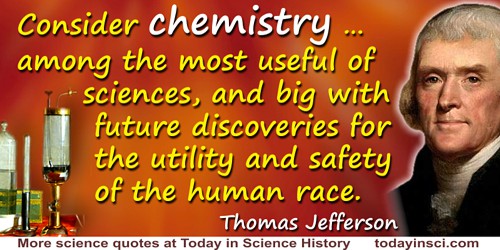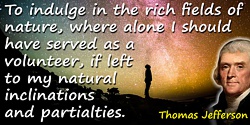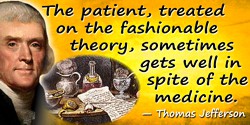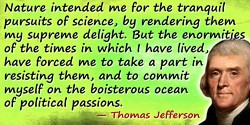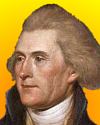 (source)
(source)
|
Thomas Jefferson
(13 Apr 1743 - 4 Jul 1826)
American statesman, astronomer, scholar and inventor who wrote the Declaration of Independence (1776) and organized the Lewis and Clark expedition (1803). His only full-length book, Notes on the State of Virginia contains an outline of the geography, flora and fauna of Virginia, and established his reputation as a scholar and a pioneering American scientist.
|
Thomas Jefferson
“Chemistry … among the most useful of sciences”
Illustrated Quote - Medium (500 x 250 px)
More Thomas Jefferson quotes on science >>
During a stay in France, Thomas Jefferson wrote a letter, on 19 Jul 1788, to Rev. James Madison of William and Mary College. Jefferson disputed the French naturalist Comte de Buffon’s opinion, but instead foresaw the many useful discoveries to be made in chemistry:
This letter reveals how Jefferson took an active interest in the progress of arts and sciences during the time he spent in Europe. He continued, speaking about the science of chemistry:
“It is yet, indeed, a mere embryon. Its principles are contested; experiments seem contradictory, their subjects are so minute as to escape our senses; and their results too fallacious to satisfy the mind. It is probably an age too soon to propose the establishment of a system. The attempts, therefore, of Lavoisier to reform the chemical nomenclature is premature.
“One single experiment may destroy the whole filiation of his terms, and his string of sulphates, sulphites, and sulphures may have served no other end than to have retarded the progress of the science, by a jargon, from the confusion of which time will be requisite to extricate us. Accordingly, it is not likely to be admitted generally.”
- Science Quotes by Thomas Jefferson.
- 13 Apr - short biography, births, deaths and events on date of Jefferson's birth.
- Jefferson As A Man Of Science - Preface to The Writings of Thomas Jefferson, Vol. 19.
- Thomas Jefferson on Education and Science from a report on establishing the University of Virginia (1818).
- Thomas Jefferson - context of quote “To indulge in the rich fields of nature” - Medium image (500 x 250 px)
- Thomas Jefferson - context of quote “To indulge in the rich fields of nature” - Large image (800 x 400 px)
- Thomas Jefferson - context of quote “The plough ... is really like sorcery” - Medium image (500 x 250 px)
- Thomas Jefferson - context of quote “The plough ... is really like sorcery” - Large image (800 x 400 px)
- Thomas Jefferson - context of quote “Chemistry … among the most useful of sciences” - Large image (800 x 400 px)
- Thomas Jefferson - context of quote “The patient … sometimes gets well in spite of the medicine. ” - Medium image (500 x 250 px)
- Thomas Jefferson - context of quote “The patient … sometimes gets well in spite of the medicine. ” - Large image (800 x 400 px)
- Thomas Jefferson on Quack Medicine - from Letter to Dr. Caspar Wistar (1807)
- Thomas Jefferson - context of quote “Nature intended me for the tranquil pursuits of science” - Medium image (500 x 250 px)
- Thomas Jefferson - context of quote “Nature intended me for the tranquil pursuits of science” - Large image (800 x 400 px)
- Thomas Jefferson - context of quote “The ocean ... like the air, is the common birthright of mankind” - Medium image (500 x 250 px)
- Thomas Jefferson - context of quote “The ocean ... like the air, is the common birthright of mankind” - Large image (800 x 400 px)
- Thomas Jefferson: Scientist, by Edwin Thomas Martin. - book suggestion.
